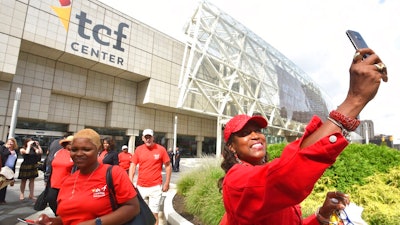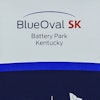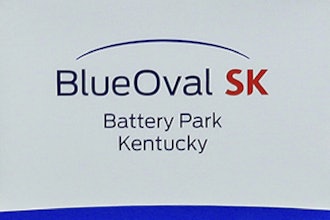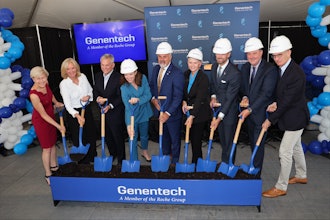
DETROIT (AP) — The home of Detroit's annual auto show and other major events has officially changed its name to the TCF Center and moved on from its original name, which honored a former mayor known for racist and segregationist policies, officials announced Tuesday.
Officials said the Cobo Center name is no more, making good on the February announcement of a $33 million naming rights deal with Chemical Bank, which is now a division of TCF Bank.
The name change will save taxpayers millions of dollars, move the riverfront facility toward being financially self-sustaining by 2024 and provide money for major capital projects, they said. It had been owned and operated by the city until 2009, when the Detroit Regional Convention Facility Authority was created.
The move also purges a negative aspect of Detroit's history: Albert Cobo, who served as mayor from 1950 to 1957, sought to keep blacks out of predominantly white neighborhoods. The convention center opened on the Detroit River waterfront in 1960, three years after Cobo died.
"From an image standpoint in the city, state and nation, being able to remove that negative connotation, which has been there for so many years, adds to the importance of this great announcement," authority chairman Larry Alexander told The Associated Press.
Vestiges of racism and intolerance are slowly being moved and removed in Michigan and other states. In the Detroit suburb of Dearborn, a statue of former Mayor Orville Hubbard, who spent decades trying to keep the city all white, was socked away for more than a year after leaders decided it didn't belong outside a new City Hall. The Hubbard statue now stands beside a small museum.
Sometimes the catalysts are much more recent: Last year, the University of Mississippi removed donor Ed Meek's name from the school now known as the "School of Journalism and New Media." Meek had posted photos of black women online and suggested that they exemplified problems threatening the local economy.
University Chancellor Jeffrey Vitter said the post had an "unjustified racial overtone." Meek and university officials then requested to end his university association. The journalism school was named after him in 2009 after he and his wife gave it $5.3 million.
When it works, granting naming rights in exchange for money can generate "financial and social capital," according to San Diego State University business ethics lecturer and attorney Wendy Patrick.
"When the new name happens to replace a name associated with negative social, racial, or other undesirable connotations, many companies would consider that to be a double win," she said. "From a business ethics perspective, the company would argue that such a move financially benefits shareholders, and generates positive social value for stakeholders — which include everyone living within the community it serves."
TCF officials say the TCF Center name change is about more than removing one moniker and adding its own, and is part of a goal to make a larger commitment to the city. For instance, it's one of seven corporations donating $5 million apiece to Detroit's Strategic Neighborhood Fund, which is aimed at boosting community development in seven areas.
"It's important to acknowledge the reality of (the former name), help change the direction and take responsibility to do so," said Thomas Shafer, TCF Bank's president and chief operating officer.
"It's more than putting a name on a building," he added. "It's helping invest and support and sustain what we think is a critical cornerstone to economic growth in our region."
In addition to the North American International Auto Show, the center also has hosted the annual Fight for Freedom Fund Dinner, the largest fundraiser by the Detroit branch of the National Association for the Advancement of Colored People.
The sprawling convention center that offers about 720,000 square feet has undergone roughly $250 million in renovations in recent years, including the transformation of what had been an arena into an atrium and meeting space.
The erstwhile Cobo Arena was home to the NBA's Detroit Pistons from 1961-78, and host to numerous rock acts, including Bob Seger, Bruce Springsteen, the Rolling Stones and Kiss. It was also the place in 1963 where the Rev. Martin Luther King Jr. delivered the first iteration of what would become known as his "I Have A Dream" speech.





















